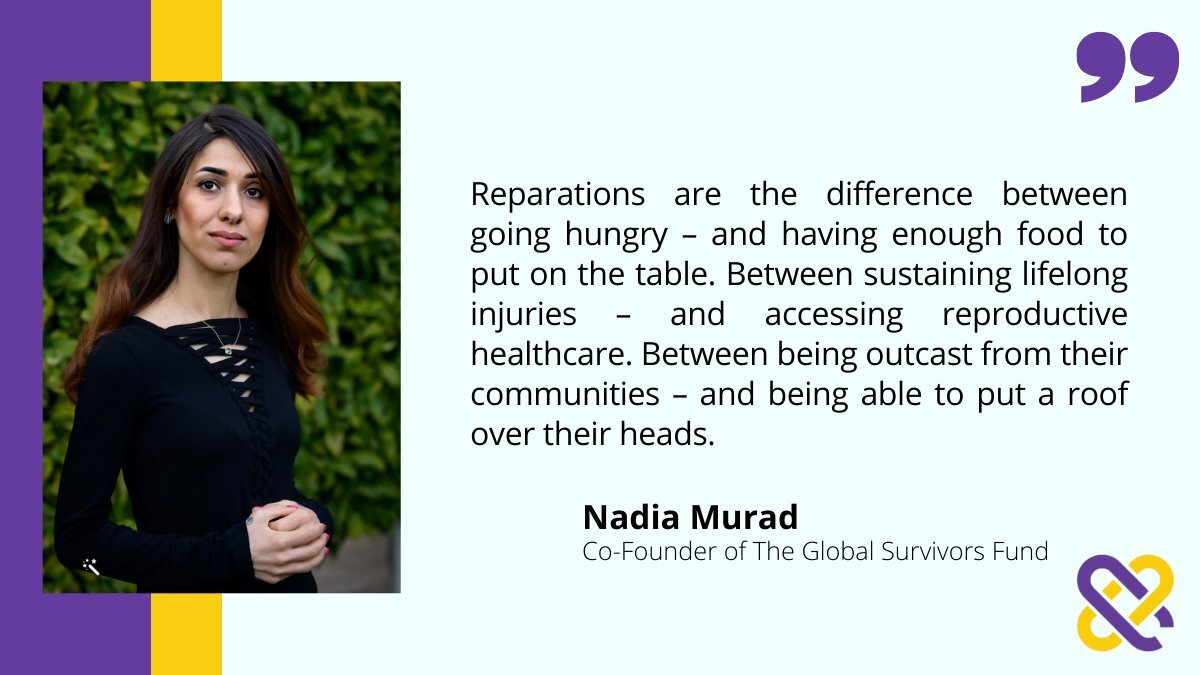Nadia Murad Makes the Case for Reparations at UN General Assembly Event
Nadia Murad joined leaders and fellow survivors on September 27, 2021 at the Reparations for Survivors of Conflict-Related Sexual Violence: Status and Prospects event hosted by the Global Survivors Fund, UN Office of the Special Representative of the Secretary-General on Sexual Violence in Conflict, and the governments of France, Japan, Republic of Korea, and United Kingdom.
Read Nadia’s remarks below:
Seven years ago, ISIS committed genocide against the Yazidi community of Iraq using one of the oldest tactics of warfare: sexual violence. While wars are no longer fought with bows and swords, rape is still widely and systematically used to rip communities apart.
Sexual violence violates not only the victims but also our universal values. An important part of ending conflict-related sexual violence is showing that we value the human rights and dignity of survivors. Eliminating sexual violence will take sustained multilateral cooperation to change the systems of gender inequality and warfare. In the meantime, reparations can be enacted today.
Victims are not to blame for sexual violence, yet they are too often left to piece their lives back together all on their own. Who is responsible? The perpetrators, of course. But also, the governments and international community that failed their mandates to protect the basic human rights of all people. Reparations are a moral responsibility for these actors to make amends. Reparations are also a vital pathway for survivors’ recovery.
To survivors, reparations are not an abstract principle of justice or a topic for legal debate. Reparations are the difference between going hungry – and having enough food to put on the table. Between sustaining lifelong injuries – and accessing reproductive healthcare. Between being outcast from their communities – and being able to put a roof over their heads.
To be clear: reparations are not charity. They are a mechanism to address the repercussions of sexual violence that ripple throughout every aspect of a survivor’s life. Many consequences of rape are invisible such as stigma, shame, and trauma. But reparations provide a tangible acknowledgment of the harm endured. Reparations cannot buy back all that survivors have lost, but they can help survivors build a new life for themselves and access the rights to which all people are entitled.
Yazidis have been waiting over seven years to restart their lives, but survivors have shamefully received little support. The Yazidi Female Survivors Law was passed by the Iraqi government earlier this year with the intention of providing a framework of reparations for survivors of sexual violence. Survivors are still waiting for the law to be implemented. Yazidi survivors cannot wait another seven years for support. Their survival and wellbeing depend on acknowledgment and amends for what they suffered. The authorities owe them at least this much.
To the leaders gathered here today. I thank you for your partnership in the work to end conflict-related sexual violence and for speaking out to condemn this crime where you see it. Today, I ask you to match your moral outrage with a clear commitment to supporting reparations for survivors.

